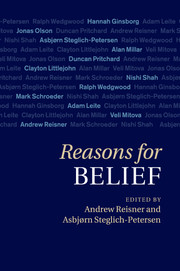Book contents
- Frontmatter
- Contents
- Contributors
- Preface
- Introduction
- PART I NORMATIVE REASONS FOR BELIEF
- PART II REASONS AND EPISTEMIC JUSTIFICATION
- 6 Reasons and belief's justification
- 7 Perception, generality, and reasons
- 8 Immediate warrant, epistemic responsibility, and Moorean dogmatism
- 9 Primitively rational belief-forming processes
- 10 What does it take to “have” a reason?
- 11 Knowledge and reasons for belief
- 12 What is the swamping problem?
- References
- Index
10 - What does it take to “have” a reason?
Published online by Cambridge University Press: 05 July 2011
- Frontmatter
- Contents
- Contributors
- Preface
- Introduction
- PART I NORMATIVE REASONS FOR BELIEF
- PART II REASONS AND EPISTEMIC JUSTIFICATION
- 6 Reasons and belief's justification
- 7 Perception, generality, and reasons
- 8 Immediate warrant, epistemic responsibility, and Moorean dogmatism
- 9 Primitively rational belief-forming processes
- 10 What does it take to “have” a reason?
- 11 Knowledge and reasons for belief
- 12 What is the swamping problem?
- References
- Index
Summary
If I believe, for no good reason, that P and I infer (correctly) from this that Q, I don't think we want to say that I “have” P as evidence for Q. Only things that I believe (or could believe) rationally, or perhaps, with justification, count as part of the evidence that I have. It seems to me that this is a good reason to include an epistemic acceptability constraint on evidence possessed.
It is a truism that adopting an unjustified belief does not put you in a better evidential position with respect to believing its consequences. This truism has led many philosophers to assume that there must, at a minimum, be a justification condition (or perhaps a knowledge condition) on what it takes to count as having evidence. This is the best (or only) possible explanation of the truism, these philosophers have believed. This chapter explores an alternative explanation for the truism. According to the alternative explanation, unjustified beliefs do not put you in a better evidential position with respect to believing their consequences because evidence you have in virtue of having an unjustified belief is guaranteed to be defeated. Since lack of justification for a belief guarantees its defeat, I will suggest, we don't need to postulate a special justification condition (much less a knowledge condition) on what it takes to count as having evidence.
Keywords
- Type
- Chapter
- Information
- Reasons for Belief , pp. 201 - 222Publisher: Cambridge University PressPrint publication year: 2011
- 48
- Cited by



